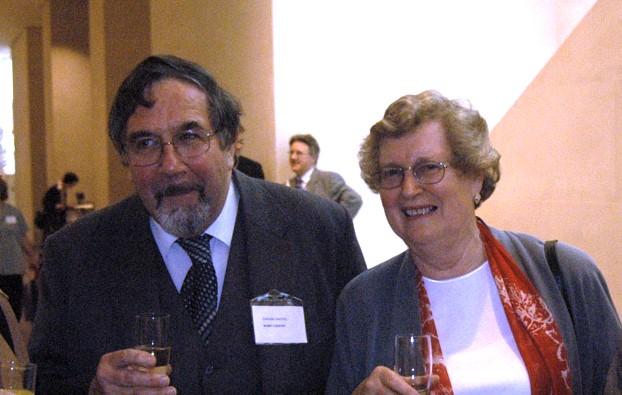Pat Story, CSCP’s second director, reflects on the life of Robin Griffin, who played a crucial role in the development of the Cambridge Latin Course.

Submitted by Anonymous on Mon, 14/06/2021 - 10:36
Robin Griffin and Pat Story pictured at the official launch of the CLC digital resources at the British Museum in 2004
I first met Robin when he was teaching the Cambridge Latin Course in the late 1960s at Crown Woods Comprehensive School in SE London. It was immediately obvious that here was a ‘natural’ – one who could stimulate the interest and learning of his students and who also had a thorough understanding of the rationale of the Course.
Later he taught the CLC at Manchester Grammar School and from there he was seconded to the Project to revise the Course for a second edition. That this had become necessary was the result of a widespread survey of teachers’ experience of teaching the complete Course. Despite its strengths, they found that the linguistic gradient of the later stages was too steep and there was insufficient emphasis on the need for consolidation. Robin’s remedy for the first problem was to write new material to ease the introduction of linguistic features. In this he showed the rare combination of creativity and control of the intricate linguistic scheme that had characterised the original writers. The second problem of consolidation was tackled, not by increasing the number of formal exercises in the textbook, but by suggesting multiple interesting ways in which the language could be practised in the context of the reading material. He also eased the transition to unadapted Latin by providing an attractive anthology of prose and verse and asking students interesting questions that integrated understanding of the language with appreciation of the literature.
After retiring early from MGS because of increasing deafness, Robin continued to work for the Project by writing perceptive notes and questions on the prescribed texts and by acting as adviser to the North American 5th edition. His last years were clouded by physical disability and dementia, a sad end for such a hardworking and talented life. He died on 27 May, aged 78.
Those of us who were privileged to know Robin will remember his jovial good humour, his friendliness and his brilliant, but unassuming, intellectual gifts. It is very fitting that he has a lasting memorial to his outstanding work for teachers and students in the Cambridge Latin Course.


